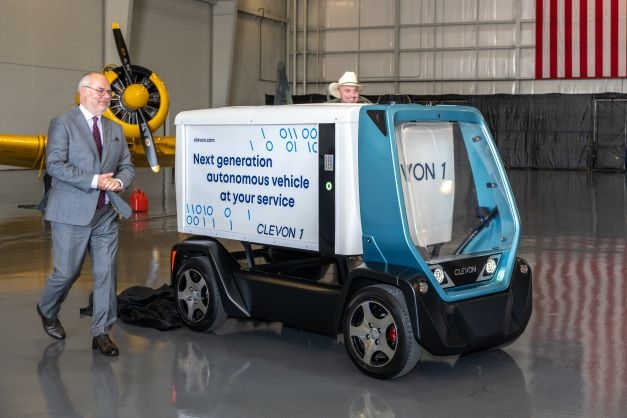Clevon, an Estonian company manufacturing autonomous delivery vehicles, has opened its North American headquarters in Fort Worth. Community leaders welcomed the Estonian president Alan Karis and Clevon’s new leadership to the city. Watch Recap
When Hillwood Chairman Ross Perot Jr. told a crowd at Alliance Airport “Fort Worth is like Estonia,” his comparison wasn’t immediately obvious. What does the former Soviet republic one-fifteenth the size of Texas have in common with Cowtown? Both places are looking forward.
The seemingly unlikely bedfellows cemented their relationship Thursday with the announcement that Fort Worth will be home to the North American headquarters of Clevon, an Estonian startup that manufactures self-driving delivery vehicles. The event attracted Estonian dignitaries including President Alar Karis. Its product Clevon 1 provides last-mile delivery services, meaning it carries items on the final leg of the delivery journey to customers’ homes. The vehicle is already being tested in Europe.
The company is the latest addition to the AllianceTexas Mobility Innovation Zone, a burgeoning hub for autonomous truck technology. Eventually, the company plans to manufacture its products in Fort Worth. With Estonia’s far-reaching technological advances and Fort Worth’s rapid growth and ravenous market, the match makes sense.
SELF-DRIVING VEHICLE HUB
In just a few years, residents of Fort Worth’s dense urbanized communities could start receiving their groceries and takeout orders from a colorful little truck, known as Clevon 1. At five feet tall, eight feet long and nearly four feet wide, Clevon 1 looks like a cartoonish miniature freight truck. It runs on electricity and can travel up to 31 mph. Some versions of the prototype feature a flatbed. Others carry what looks like an Amazon locker where customers can enter a code to retrieve their delivery.
The company is getting state and federal approval to operate its vehicles on public roads. It’s also in talks with potential partners. “We selected to place our headquarters here in Texas, because of the great business environment, as we have managed to create great partnerships that are essential to scale and commercialize autonomous vehicle technologies,” said Clevon CEO Sander Sebastian Agur.
Clevon isn’t the only company that’s identified Fort Worth as an ideal location for innovation and growth. The Alliance Mobility Zone is also home to driverless truck company TuSimple, which is backed by UPS.
FORT WORTH AND ESTONIA
When Ross Perot Jr. flew to Estonia this summer, he expected his visit to be like prior travels to other eastern European countries.
The first indicator of Estonia’s advancement was the quality of its airport runways, he said. And that was just the beginning. “It’s one of the great technology countries of the world,” Perot said. In 2002, the country launched a national ID system, where all Estonians receive a physical card that allows them to pay taxes, vote and access health care records. Almost all Estonian governmental services — like voting and taxes — are available online.
“We need to go to Estonia and copy what they’re doing in Fort Worth,” said Perot. The first step to emulating the country’s digital successes is to see them firsthand, Karis told the Star-Telegram. “We need to bring people from different countries to Estonia,” Karis said. “Come to Estonia and you’ll understand what’s going on.”
ESTONIA’S NEIGHBOR
On the presenter platform at Alliance Airport, three flags stood behind the podium: the American flag, the Estonian flag and the Texas flag. A fourth flag could be seen on the lapels of many in the Estonian delegation: yellow and blue for Ukraine. For people living in a country that borders Russia, the specter of war hangs over everything — even events halfway across the world celebrating technological advances. Estonia has admitted more than 50,000 Ukrainian refugees, mostly women and children, and is providing schooling to Ukrainian children, Karis said.
When asked about the geopolitical moment, Karis simply said, “He’s mad,” in reference to Russian President Vladimir Putin. In his address, Perot congratulated Estonia on its 30 years of freedom from the Soviet Union and connected the country’s independence to its entrepreneurial spirit. “When you deal with people that lived under Russia and under communism, when they have their freedom, they are determined not to go back,” said Perot. Despite the nearness of the conflict, Karis is confident in his country’s security. Thanks to the umbrella afforded by NATO and the country’s own military forces, Karis said, Estonia’s independence — and freedom to innovate — remains intact.
